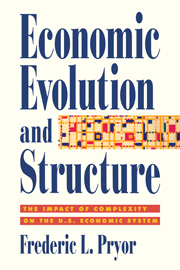Book contents
- Frontmatter
- Contents
- List of tables and diagrams
- Acknowledgments
- 1 Complexity in the economy
- 2 Population
- 3 The labor force: Complexity and unemployment
- 4 The labor force: Changes in sectors and organization
- 5 Wealth, ownership, and the financial structure
- 6 Production institutions and management
- 7 The behavior of markets
- 8 The foreign trade sector
- 9 The government sector
- 10 The future of U.S. capitalism
- Appendix notes
- Bibliography
- Index
1 - Complexity in the economy
Published online by Cambridge University Press: 05 June 2012
- Frontmatter
- Contents
- List of tables and diagrams
- Acknowledgments
- 1 Complexity in the economy
- 2 Population
- 3 The labor force: Complexity and unemployment
- 4 The labor force: Changes in sectors and organization
- 5 Wealth, ownership, and the financial structure
- 6 Production institutions and management
- 7 The behavior of markets
- 8 The foreign trade sector
- 9 The government sector
- 10 The future of U.S. capitalism
- Appendix notes
- Bibliography
- Index
Summary
I wished a simple life for me.
The web I see is too complex to be.
I wish that I might unwind this web I've made.
The knot is twisted and hard.
To cut it would destroy the whole and make discord.
This cannot be.
Spinning tighter and tighter until it breaks.
This life I have begun to Make.
Alberta BontempsOur society is becoming more complex, not just our personal lives. These two developments stem from many of the same causes, and reversing such trends does not seem feasible in either sphere. Indeed, with solemn mien politicians, preachers, futurists, and fanatics have told us so often that the world, in general, is becoming more complex that the idea seems commonplace. Nevertheless, in particular situations the meaning of this idea is often obscure: What do such pronouncements concretely mean, for instance, regarding the economy? Under what specific circumstances is the assertion true? Most importantly, how does it affect our daily lives?
I have written this book because I believe that the concept of complexity is crucial for understanding the evolution of the U.S. economic system. Defined precisely and used as a tool of quantitative research, it leads us to ask new questions about the economy, as well as to give us new answers to many old questions. It allows us to see how the population is becoming more heterogeneous, an important factor underlying the decline of social cohesiveness in the United States.
- Type
- Chapter
- Information
- Economic Evolution and StructureThe Impact of Complexity on the U.S. Economic System, pp. 1 - 17Publisher: Cambridge University PressPrint publication year: 1995



